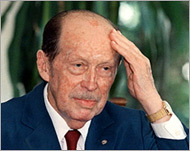G-20 demands end to farm subsidies
Poor nations have turned up the heat on rich countries in world trade talks by urging them to scrap all farm export subsidies within five years.

The demand on Saturday was levelled principally at the 25-member European Union, the biggest subsidiser of agricultural exports, which offered last July to end the practice but set no timetable and insisted that other rich countries make similar concessions.
An end to export subsidies and deep cuts in other handouts to rich-country farmers are the main objectives of developing nations in global market-opening talks being held under the umbrella of the 148-member World Trade Organisation.
“Export subsidies must be eliminated as fast as possible and no later than five years,” Indian Commerce Minister Kamal Nath told a news conference after chairing a two-day meeting of the G-20 group of developing countries in the Indian capital.
Other leading members of the alliance, formed in 2003 to seek a better deal for third-world farmers, include Brazil, China and South Africa. The G-20 accounts for 65% of the world’s population, 72% of its farmers and 22% of agricultural output.
Accusations
Developing countries accuse rich countries of using subsidies to dump farm produce on world markets and then compounding the hardship for poor farmers by erecting high tariff barriers to keep out their exports.
|
“Export subsidies must be eliminated as fast as possible and no later than five years” Kamal Nath, |
Without naming names, a G-20 statement singled out the EU by expressing concern that some WTO members had gone against the spirit of the world trade talks by reintroducing export subsidies. Brussels brought back wheat subsidies in February after an 18-month gap to reduce mounting stockpiles.
“The rules of the game have to be made by countries by consensus. We cannot have a situation where global trading rules are made by a select few countries,” Nath said.
The G-20 called for an immediate standstill to subsidies and said any future pact to scrap them should be front-loaded to speed relief to poor countries and give momentum to other areas of the trade talks, such as services and industrial tariff cuts.
No real progress
The trade talks have made fitful progress since they were launched in Doha, the Qatari capital, in 2001. A meeting in Cancun, Mexico, collapsed in September 2003 but negotiators managed to agree on a framework deal last July. Ministers will meet next in Hong Kong in December to flesh out that agreement.
 |
|
Brazilian Foreign Minister Celso |
Celine Charveriat, a campaigner for the development group Oxfam, said the unity displayed by the G-20 would increase pressure on industrial countries in the run-up to Hong Kong.
“It enhances the chances of a pro-development agreement. But if developed countries are not willing to make some concessions, we might see a failure like we did in Cancun,” she said.
The G-20’s broad membership is both its strength and its weakness.
Different emphasis
While it was able to deliver a strong message on farming, the group sidestepped areas of discord such as how much preferential market access to grant the poorest countries and how much to open their own markets to industrial goods and services.
“Of course, there are nuances but the beauty of the G-20 is unity in diversity. We may have different emphases, but we don’t have any destructive contradictions,” said Brazil‘s foreign minister, Celso Amorim.
“This was a very positive meeting that showed the G-20 is not only alive and kicking but it’s kicking in a very forceful, pragmatic manner,” he said.
To show that it is there to stay, the G-20 unveiled a logo for the group and welcomed a new member, Uruguay, to its ranks.